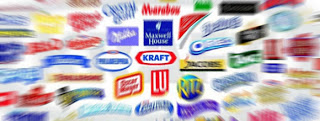Not many people realize that most of the processed foods available on the market, whether it be in groceries or fast-food chains, all come from the same few companies. Even less people realize that those companies are major actors in elite organizations who decide health, social and economic policies around the world. We’ll look at these companies who feed the world, their many brands and the tactics they undertake to make people crave their products
If one were to carefully study the labels on packaged products in an average grocery store, one would probably notice that the same company names appear repeatedly: Nestlé, Kraft, General Mills and a few others. Many brands offering good ol’ fashioned homemade or all-natural/organic foods are nothing more than subsidiaries of these few world-wide mega-companies. The major difference between the main brand and the subsidiaries is packaging and advertising, which are targeted to reach different markets. In order to preserve the carefully crafted image surrounding a product, connections to the mother company are often conveniently hidden. Imagine an advertisement for bottled water going like this: “Drink pure, clear, refreshing Aquafina water, bottled with care from remote natural sources in the Himalayas … BROUGHT TO YOU BY PEPSICO, THE MAKER OF TACO BELL AND CHEETOS MIGHTY ZINGERS!” That would probably spoil the healthy, natural image they are trying to create for the product.
That is the reason marketing and branding are the most vital part of the food industry. Each product must live in its own “world”, separate from its mother company and similar products. Advertising is so powerful that two similar brands of cereal, made from the same basic ingredients, can be targeted to entirely different markets. For example, are Special K and Rice Krispies so different? From a strictly rational viewpoint, these products are nearly identical in shape, taste and ingredients. From an irrational (marketing) viewpoint however, they are in two different worlds. Advertisements for Rice Krispies revolve around colorful cartoon characters and played during Saturday morning kids’ shows while Special K tends to show fit women doing yoga (or on their way to or from yoga). Rice Krispies boxes have games and toy giveaways, while Special K‘s box gives access to a “weight loss challenge” website. All of this is smoke and mirrors, however, because at the end of the line, whether you choose one, the other or pretty much any other cereal in the grocery store, you’re eating the same thing and your money ends up at the same place.
The processed-food industry can be considered a true oligopoly. Together, the three leading food companies, Nestle, Kraft Foods and PepsiCo, achieve a dominant proportion of global processed-food sales. In fact, these three companies are often used as an example of “Rule of Three” in business schools, since they are a real-life example of a market being dominated by three gigantic actors. Their position as worldwide food providers has made these conglomerates extremely powerful, and they are represented in most elite organizations such as the Council of Foreign Relations. This not only allows them to provide their preferred policies on nutrition and health issues across the globe, but on economic, political and social issues as well. Such prominence also allows these companies to ensure their continued market dominance, through policy-making, access to insider information and the intimidation of potential competitors. If considered objectively, the oligopoly of major companies like these are a direct threat to free market theories.
Today, if a small food company were to create a new revolutionary product, it would find it difficult to obtain distribution without giving up its rights to one these conglomerates. In addition to dominating the shelves, the Big Three control most of the worldwide channels of distribution, to the point that up-and-coming companies cannot reach the consumers without dealing with them. The only way small business owners can avoid years of struggle and rejection to obtain shelf-space in supermarkets is to strike a licensing deal with one of the giants, where the owner cedes the ownership and the rights to the product in exchange for royalty checks (which are usually a small percentage of the sales). Each licensing deal consolidates these companies’ position and eliminates threats from any potential competitor who creates game-changing products.
Here are the top three companies and a summary list of their multiple brands:
linkwithin_text=’Related Articles:’





Be the first to comment on "Irrational Consumerism (or The Few Companies Who Feed the World)"